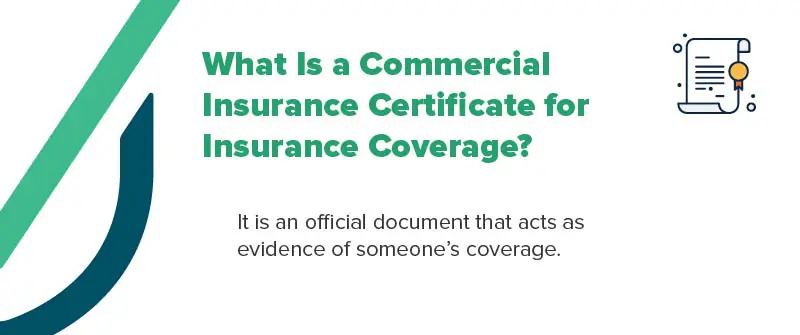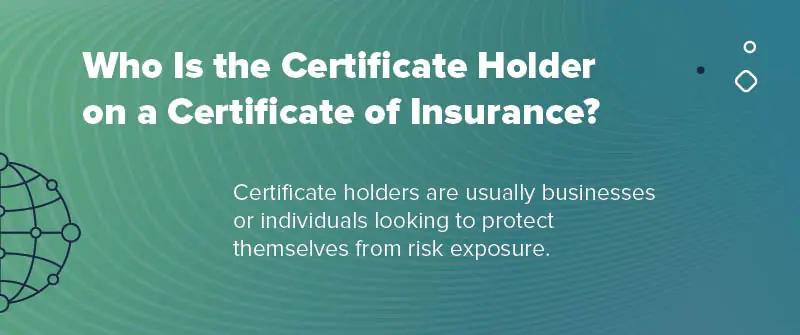
Next up in our Certificate of Insurance 101 blog series, we delve into the world of commercial insurance certificates, an indispensable tool in the arsenal of any savvy business owner. Imagine navigating the complexities of business relationships without a safety net; that’s where the commercial insurance certificate comes into play. It’s not just paperwork; it’s peace of mind.
What Is a Commercial Insurance Certificate for Insurance Coverage?
A certificate of insurance, or COI, is a necessary insurance concept to know about. It is an official document that acts as evidence of someone’s coverage. It provides a snapshot view of an insurance policy, summarizing crucial information so that a hiring party can validate and verify its existence.
A commercial insurance certificate is still a COI, just specifically for a business. Commercial COIs are common as many businesses hire other businesses as third-party service providers (such as contractors and subcontractors) or as vendors (such as suppliers). They provide evidence of your insurance coverage to clients, customers, and other third parties—or, on the reverse, provide evidence of another party’s coverage to you. Ultimately, certificates help ensure that you are protected in the event of a claim because your vendor’s insurance coverage should step in first, leaving your business off the hook in the case of covered circumstances. Learn more about subcontractor insurance requirements.
Diving Deeper: Types of Coverage
Embarking on the journey of understanding commercial insurance certificates requires a pit stop at the various types of insurance they cover. The landscape of business insurance is vast, encompassing:
- General Liability Insurance: The cornerstone of business protection, offering defense against claims of bodily injury, property damage, and more.
- Workers’ Compensation: A mandatory safeguard in most states, providing benefits to employees who get injured or sick from their job.
- Commercial Auto Insurance: Essential for businesses that own or use vehicles for work purposes, covering damages and injuries resulting from work-related vehicle accidents.
- Property Insurance: Protects the physical assets of a business, from the bricks and mortar of your office to the equipment inside.
Understanding the nuances of each insurance type and ensuring your certificate accurately reflects your coverage is crucial. It’s not just about having insurance; it’s about having the right insurance for every twist and turn your business might face.
Next, we’ll cover some common questions that come up about commercial certificates of insurance.

Is a Certificate of Insurance a Legal Document?
Certificates of insurance are legal documents used in business transactions and partnerships across many different industries. COIs were invented and popularized by a nonprofit organization called ACORD to standardize processes across the insurance industry, and they’re now the most accepted method of providing evidence of coverage. To learn more about COIs, be sure to peruse Certificate Of Liability Insurance ACORD samples online in their forms portal. Remember that these samples can be informative but should never be used to attempt to create your own COI, which is an illegal practice.
Is a Certificate of Insurance the Same as a Declaration Page?
Let’s clarify a common question that comes up in the world of insurance: is a COI the same thing as a declaration page? The answer is that while the two are similar, they are different entities that serve slightly different purposes.
The purpose of a declaration page or dec page is to serve as a reference point for an insured. They are automatically generated along with an insurance policy and are usually included on the first page of the dense policy documentation. The purpose of an insurance certificate or COI is to provide evidence of someone’s coverage, typically as a third party and for another party, such as the one hiring or leasing property to the policyholder. Both documents provide summaries of insurance coverage; the difference lies in who they are intended for.
So, as a hiring party, you are likely more interested in a COI, in particular for your sub-contractors general liability insurance or other more specific liability coverage. This can include business insurance or commercial general liability insurance. In this case, you would request a general liability insurance certificate.
Who Is the Certificate Holder on a Certificate of Insurance?
Speaking of who a certificate of insurance is intended for, that party will be referred to as the certificate holder. Certificate holders are usually businesses or individuals looking to protect themselves from risk exposure. Some examples of certificate holders for commercial insurance certificates include:
- Leasing commercial spaces: A property owner may request a commercial COI from a prospective business tenant to protect themselves from financial risk before offering a lease agreement to them. The property owner or landlord would be the certificate holder here.
- Vendor relationships and contractual agreements: A business purchasing goods or services from any vendor may request a COI from them to protect them as the buyer from potential liabilities associated with the products or services supplied. In this scenario, the buying business would be the certificate holder, while the vendor would be proving their coverage.
- Event hosting or venue rentals: When hosting an event for commercial purposes, the organizer will often ask for COIs from vendors. The event host would be the certificate holder.

How To Get a Commercial Insurance Certificate from an Insurance Company or a Vendor?
To finish out, let’s discuss how actually to get one of these infamous COIs. To obtain a commercial insurance certificate for a vendor or third party, you will need to do the following:
Submit a COI request to the vendor or policyholder from whom you want to obtain a commercial insurance certificate. In this request (typically a mailed letter or digitally delivered communication), you will outline the specifics of your request, such as what kind of policy you need evidence of, the minimum coverage limits you’re expecting for your project, etc. Additionally, you can make extra requests of your vendor, even ones that they will have to modify their coverage for, such as asking to be listed as an additional insured on the policy.
Upon receiving the request, the vendor will book time with their insurance provider to receive a commercial insurance certificate online or in person. The insurer will review the details of the request and make sure the policy as it currently stands meets all requirements or works to change the policy so that it does. Note that while making changes to a policy can come with a cost in the form of increased premiums, a COI is free for a policyholder to request and an insurer to generate.
Once you have their generated commercial insurance certificate, you should validate it and store it in your records, as well as monitor it over time to ensure that it still meets your project’s needs in the future.
myCOI: The COI and Compliance Partner for You
Our certificate-tracking compliance management software automates the error-prone parts of managing COIs. With myCOI, you get more compliance and fewer claims. Reach out today to learn how we can help you manage your commercial insurance certificates with ease.